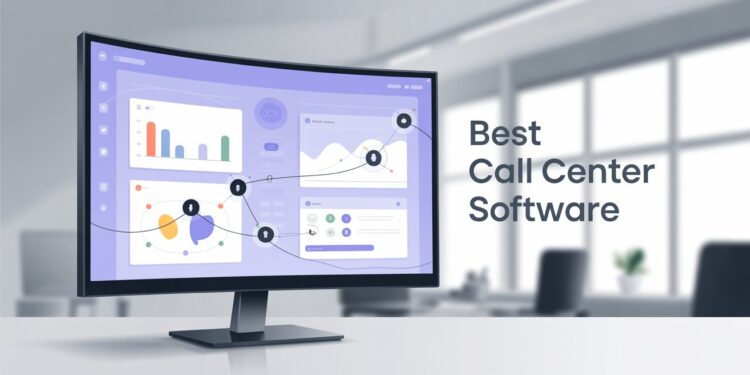Call center software is a digital platform that helps businesses manage and streamline high volumes of customer interactions, primarily through voice calls but often extending to chat, email, and other channels. This type of software automates key tasks such as call routing, collecting caller information, providing pre-recorded responses to common questions, and transferring conversations to appropriate departments or channels.
Modern call center solutions are often cloud-based and AI-enhanced, enabling real-time analytics, personalization, and seamless integration with other business tools like CRMs and help desks.
How Does a Call Center Phone System Work?
Call center phone systems are designed to manage customer interactions efficiently by combining telephony infrastructure with intelligent software features. Here’s how they generally operate:
-
Data Collection: When a customer calls, the system can automatically prompt for details such as account numbers or issue types using an IVR (Interactive Voice Response) system.
-
Call Routing: Based on customer inputs, the system uses Automatic Call Distribution (ACD) to route the call to the right agent or department.
-
CRM Integration: Customer details are matched with existing records, allowing agents to access relevant context before answering.
-
Live Assistance & Automation: Depending on complexity, the software either routes the call to a live agent or uses AI to provide an automated response.
This infrastructure helps agents provide faster, more accurate, and personalized service.
Why Use Call Center Software?
Companies with frequent customer interactions can benefit significantly from call center software. Key reasons to adopt it include:
-
Improved Customer Support: It allows faster resolution, fewer transfers, and consistent service across all channels.
-
Increased Efficiency: Automates repetitive tasks and reduces reliance on manual processes.
-
Scalable Operations: Easily accommodates business growth without the need for additional hardware.
-
Cost Savings: Lowers operating costs by reducing call handling time and minimizing human error.
-
Performance Insights: Built-in analytics help track key metrics like call volume, agent performance, and customer satisfaction.
Whether you’re handling inbound, outbound, or blended communications, this software helps you deliver reliable and professional service.
Who Uses Call Center Software?
Call center software is widely used across industries that experience high volumes of customer inquiries, including:
-
Healthcare: For scheduling, follow-ups, and patient support.
-
Banking & Finance: For transaction queries, account support, and fraud alerts.
-
E-commerce & Retail: To manage order-related concerns, returns, and delivery updates.
-
Technology & SaaS: For onboarding, troubleshooting, and customer education.
-
Business Services & BPOs: To support clients in handling outsourced customer communication.
Essentially, any organization that prioritizes customer engagement and support can benefit from implementing this software.
Requirements to Set Up Call Center Software
Setting up call center software for your organization involves a few key steps:
-
Choose a Provider: Select a software vendor based on your industry needs, scalability, and feature set.
-
Select a Plan: Start with a free trial or paid plan. You may either obtain a new business number or migrate your existing one.
-
Configure the Platform: Set up call flows, IVR menus, and routing rules to align with your internal processes.
-
Integrate Systems: Connect your call center software with CRMs, ticketing tools, or help desk platforms to centralize information.
-
Train Your Team: Ensure agents and supervisors are trained to use the system effectively.
-
Test and Launch: Perform quality assurance tests and soft launches before rolling it out fully.
With cloud-based tools, this process is often quick, and the system can be operational in just a few days.
Top 12 Best Call Center Software
We have compiled a list of the Top 12 Best Call Center Software. Let’s have a look at the list given below.
1. Zendesk
For a smooth customer experience, Zendesk call center software is integrated with the Zendesk ticketing system. Our software accelerates problem-solving for growing teams while monitoring and enhancing phone support operations. Your team will provide a superior customer experience across channels with Zendesk. You can be sure to find a plan that meets your needs among our broad range.
2. Webex
The call center software offered by Webex is a strong competitor to take into consideration if dependability, ease of setup, and extensive features are among your goals. On this cloud-based solution, up to 1000 remote workers, on-site workers, or a combination of both can work together smoothly and at the same time. Webex is a wonderful solution for smaller firms that are just starting to establish their call center, despite its enterprise-level power and sophistication.
3. Zoho Desk
Did you know that Zoho Desk is a reliable option to take into consideration for your call center solution in addition to being a help desk, website builder, CRM, and more? The call center software from Zoho is cloud-based, has a user-friendly user interface, and works well with everything else in the Zoho product ecosystem. Implementing, utilizing, and maintaining the product will be very simple for Zoho Desk users.
4. LiveAgent
LiveAgent is much more than just call center software like Zendesk. Full helpdesk features, including live chat, ticket management, omnichannel support, and more, are included in LiveAgent packages. The LiveAgent All-inclusive plan offers access to the call center software tools together with the aforementioned helpdesk features. LiveAgent may contain numerous capabilities you don’t absolutely need if your focus is solely on call center software.
5. TalkDesk
While some call centers just take incoming or outgoing calls, others handle both. TalkDesk offers the features you need to handle both types of calls for those hybrid contact centers. The deployment is entirely cloud-based, so you don’t need to download any new software to your own PCs to accomplish this. TalkDesk has handy, contemporary features like a simple mobile app that agents may utilize from anywhere.
6. GoToConnect
GoToConnect’s contact center as a service might be of interest to you if you are familiar with the concept of software as a service. The only difference between CCaaS and SaaS is that CCaaS is only applicable to call center software. Similar to SaaS, GoToConnect has a number of entirely cloud-based options with a variety of call center services. Inbound, outbound, and hybrid call centers can all benefit from GoToConnect’s adaptable contact center software.
7. NICE CXone
NICE CXone is designed to equip your agents to create better, more effective customer experiences by combining customer context and sophisticated call center functionality into one simple interface. Although it might be suitable for smaller companies, NICE CXone is a true corporate solution. Everything needed to streamline call center operations will be available for larger, more complicated service firms. Additionally, NICE CXone has a robust collection of tools that managers may use to improve customer service while reducing costs.
8. Bitrix24
Similar to Zoho Desk in terms of call center software, Bitrix24 is less well-known in the industry. Bitrix offers standalone CRM, project management tools, and call center functionalities that support incoming, outbound, external, and internal calling requirements. Bitrix’s free plan is a significant plus. The free plan can give you a decent sense of what to anticipate from the Bitrix interface while having a limited feature set.
9. Dialpad
Dialpad is a really cutting-edge call center solution with a rich feature set created for both inbound and outbound dialing. Call sentiment analysis, real-time text transcription, and even an integrated AI that can automatically produce question-specific call scripts for agents are just a few of its many distinctive and cutting-edge capabilities. Additionally, you can stay connected on any device, anywhere, thanks to its mobile app.
10. Five9
When your consumers are far spread, and you are responsible for long-distance expenses, usage fees for call center software can quickly add up. But Five9 supports a top-notch calling experience for both clients and agents while helping you control operating costs. Depending on your demands, these packages can be configured on your existing equipment and include no-cost long-distance calling. Five9 provides a wide range of phone solutions, including business VOIP, in addition to its potent call center software.
11. CallHippo
CallHippo is a smart call center solution that makes inbound and outbound dialing easier. It was created for support and sales teams. There are four versions of this cloud-based telephony product available for small businesses, startups, SMBs, and large corporations. However, if you want the most advanced capabilities, regardless of the size of your team, you might need a higher-tier package. CallHippo provides premium add-ons for features like custom caller ID, call transcription, voicemail transcription, and more in addition to their services.
12. Twilio Flex
Twilio will be an interesting choice for you if you’re a DIYer with the time and money to hire developers or if you already have a crew of engineers knowledgeable about APIs. The offers a Voice SDK and open API that your developers may use to construct a contact center solution that is completely tailored to your business’s needs wants, goals, and dreams, as opposed to pre-packaged software. With Twilio, you have the option of doing anything from custom-developing your own web-based call center application to call transcription and queue management.
How should your team choose the finest contact center software?
The following three inquiries will help you choose the best contact center software for your team:
What compatibility will the software have with my present and future teams?
If a medium shirt fits better, you won’t get an extra-large shirt just because it has more cloth, would you? Software for call centers follows the same logic. The option with the features that work best for your team, not the most features, is the best choice.
Nevertheless, it’s crucial to understand that your current team won’t stay the same forever. The number of calls may increase, new goods may need different services, and your staff may grow. All of these variables will change which software is the best option for your team. In order to avoid outgrowing your software, it is best to balance your existing situation with your anticipated future needs.
What improvements in service quality and cost savings are anticipated?
Although the price of your software is an important factor, avoid thinking exclusively in terms of expense. When used properly, contact center software can save you money and enhance customer service beyond what it costs.
The best approach to determine the potential return on investment from a particular contact center solution is to use it. Alternatively, if your vendor doesn’t provide a long enough free trial, you might choose a monthly plan to avoid committing to a full year. In this manner, you can fully understand how contact center software will affect your company’s bottom line.

















